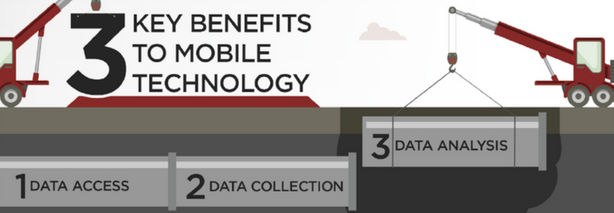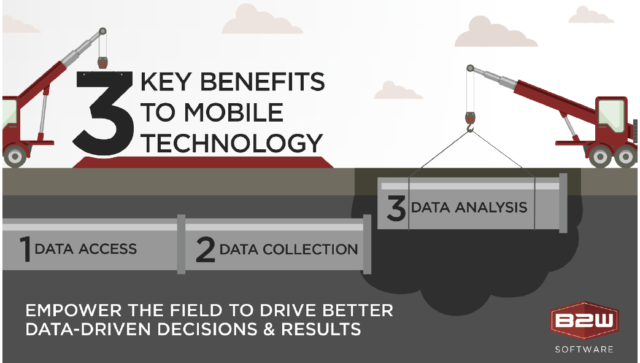
The Value Proposition for Mobile in Heavy Civil Construction
Heavy civil construction projects need to carefully manage logistics in order to ensure success. Project complexities are driven by large amounts of resources over huge geographic regions, with three key resources needing optimization so projects are efficient and successful:
- People
- Equipment
- Materials
The rise of mobile technology is well aligned to address the field operations requirements associated with optimizing people, equipment and materials. The following framework demonstrates the advantages of web and mobile technologies on heavy civil projects.

- Data access means putting the right data in the hands of the right people at the right time so they can be empowered to deliver the best results. Some of the problems we see with current field processes include lack of access to data in disparate systems, time lag associated with finding information and lack of collaboration between the field, office and shop. These problems are compounded when the information is not structured or is captured on paper. Leveraging the right mobile solution unifies data in a single source of truth that is purpose-built for the specific user and addresses these problems…
- Automating data access with GPS-enabled mobile devices delivers the information to the right people based on their location.
- Enabling real-time access and collaboration with mobile connectivity to the cloud unites the office, field and shop.
- Data collection in the field is key to ensuring that managers have the information needed to make the right decisions to ensure projects adhere to budget and schedule, all while minimizing risk due to safety and quality requirements. Today this data is often collected with paper processes that result in unstructured, error-prone data. Additionally, the time it takes to collect this information distracts employees from their primary responsibility – getting work done. Moving to mobile technology-based processes has the following benefits…
- Real-time. When the field is equipped with the right mobile software they are able to rapidly capture data that can be accessed by all stakeholders shortly after submission. Mobile solutions are easy to use and very portable, so whenever an issue arises, data is captured with a formal process – turning your field staff into a crowd-sourced big data provider. Gone are the days when a foreman sees an issue, makes a note on scrap paper because the proper form is back in the truck, and puts the note in his pocket, where it will eventually make its way back to an admin in the office for data entry (if it can be deciphered).
- Structured. Mobile solutions present the user with a digital form that organizes the way information is collected. The base expectation is a digitized paper form, but because the information is collected digitally, mobile solutions can drive data entry consistency and accuracy. Reports and forms can automatically be augmented with metadata, including location, project, time of day, user, process, etc. Field data becomes smart and gets linked directly to a structured database for easy retrieval and analysis. This expands beyond the written note, sketch or photo – it can include digital notation, structured lists, linked media, electronic signatures, sensor feed data, etc.
- Automated. Most data collection activities are repetitive, so a mobile technology approach can save significant time through automation. For example, most forms can easily be started with a previously completed form, pre-populated fields and pick lists can be leveraged, and device sensors or cloud connected inputs can auto populate key fields.
- Data analysis is key to leveraging all of the information from the field in a way that will help drive better decisions around project operations, while offering greater insight into the performance of the project portfolio. Moving this data to a single, digital source of truth enables better project reporting and business intelligence that helps managers quickly analyze project performance and make empowered, data-based decisions.
- Reports. Reports can be generated quickly in any form or template using software applications that leverage field data.
- Dashboards. Web and mobile dashboard views of project performance are powerful tools for managing field operations. They provide the office and field with the same views so they can get aligned on daily project performance. This allows teams to uncover trends and minimize reaction time when issues arise. Real-time dashboards can also motivate the field team as they track performance against the planned progress.
- Business Analysis. The sheer quantity of data being collected is both a problem and an opportunity. Leveraging an analysis tool allows managers to pull insight from the historical or project data so that they can make better decisions to ensure better project outcomes. This analysis can impact ongoing project execution, but also has significant relevance when planning new projects. For example, cost management is a field-centric activity, but often the learning curve of a project is not captured back in the office by those who bid and plan future jobs. Capturing quality progress and production rate information in the field means better estimates, budgets and schedules created at the project start, resulting in better planning and execution.
Leveraging Mobile devices and software for Heavy Civil Construction operations to deliver the 3 benefits above are essential to staying competitive, productive and profitable.
By Rich Humphrey
Rich is a former Vice President of Marketing at B2W Software.







Leave a Reply
Want to join the discussion?Feel free to contribute!